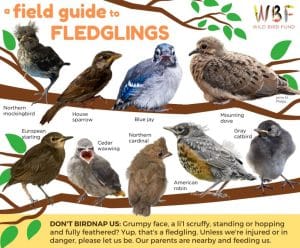Yesterday, I was taking a walk around when I heard a bush singing. Curious, I walked around the bush and found a bird nest- with some baby mockingbirds! I leaned in to get a closer look when one of the birds fell out of the nest. It ran away from me, but I ultimately caught it. It tried to kick me with its claws and flap its wings when I took it back to the bush with the nest. I was trying to squeeze my hand through the bush and return it to the nest when I heard something flap above me- and in no time- its parents were diving into my hair! After I wrestled my hand with the baby bird into the nest, I backed away from the bush- and that baby bird fell out of the nest again. This time, I decided to leave it to the parents and went home to do some research.
Luckily, no one was harmed. I should’ve consulted Google before handling the birds. Here are some facts about baby birds so you don’t make the same mistakes I did.
The different stages of baby birds
Baby birds are born in spring or early summer. Many birds in North America nest in May. Nestlings are recently hatched. They are usually blind and have few feathers. The nestlings eventually grow in their feathers and become fledglings. Mockingbirds become fledglings at 12 days old. Fledglings usually leave the nest before learning to fly. The parents are watching nearby, so they can check on the fledgling and bring them food.
Bird parents can be super territorial!
I learned the hard way to not mess with bird families! Mockingbirds are territorial and aggressive during nesting season, so they will attack people who are too close to their nest. They have also attacked cats, dogs, and hawks. Songbirds might chase you or swoop around you to scare you away from the nest, but you’ll be fine if you back off. It’s a lot more dangerous and scary if you encounter a big bird species. Baby Canada geese look cute, but you don’t want to be near a Canadian Goose nesting site when the parents are around!
What to do if you find a baby bird
Most of the time, you should leave the bird alone. Most baby birds found on the ground are fledglings and their parents are taking care of them. If the fledgling is near somewhere dangerous like a road, it’s ok to move the bird to a nearby bush or somewhere safer. If the bird is a nestling, it should be returned to its nest. Nestlings can’t walk or run very far, so the nest should be nearby. The parents won’t abandon a baby bird if you touch it.
Yes, baby birds are super cute
I mean, just look at this. They look like little fluffy versions of their parents!

Just resist the urge to pet one when you see one.
If you want to learn more about birds, Cornell has a good website with bird ID and information: https://www.allaboutbirds.org/guide/search
You can also install a birdbath or a bird feeder to attract birds into your yard.

